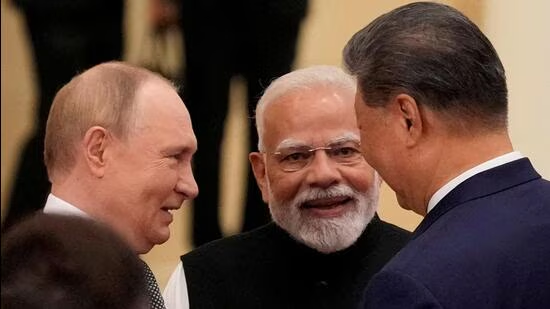
Trump
New Delhi / Washington, September 5, 2025 – In a sharply pointed post on his Truth Social platform, U.S. President Donald Trump asserted that the United States has seemingly “lost India and Russia to deepest, darkest China,” a remark sparked by the recent display of unity among the three nations at the Shanghai Cooperation Organisation (SCO) summit. India’s Ministry of External Affairs (MEA), meanwhile, opted for a cautious stance—declining to comment publicly on Trump’s remarks.
Trump’s Provocative Post
The post came on the heels of the SCO summit in Tianjin, where Prime Minister Narendra Modi and Russian President Vladimir Putin appeared alongside Chinese President Xi Jinping, underscoring a sense of growing strategic alignment. Sharing a photo of the leaders walking and standing together, Trump posted:
“Looks like we’ve lost India and Russia to deepest, darkest China. May they have a long and prosperous future together!”
Analysts interpreted this as more than sarcastic banter—it reflected a broader concern about deepening ties among the three countries at a time when U.S.–India relations face significant strain.
New Delhi’s Deliberate No-Comment Strategy
At a press briefing, MEA spokesperson Randhir Jaiswal was asked about Trump’s post. His response was measured: “I have no comments to offer on this post at this time.” Yet Jaiswal also emphasised the importance of the U.S.–India partnership, highlighting ongoing cooperation through mechanisms like the Quad, bilateral military exercises, and trade dialogue.
The Rising Diplomatic Squeeze
This episode unfolds against a backdrop of intensified friction between Washington and New Delhi. The U.S. recently imposed steep 50% tariffs on Indian goods, citing India’s growing oil imports from Russia—discounted crude that Trump has repeatedly condemned as supporting Moscow’s war machine.
Further fueling tensions are India’s continued strategic autonomy and deepening outreach to Russia and China. Modi’s participation at SCO, alongside Putin and Xi, sent clear signals of multipolar diplomacy—leaving U.S. officials wary of a shift in global alignment.
Implications of Trump’s Remark
Erosion of U.S. Influence: Trump’s post captures heightening anxiety in Washington that India may be drifting beyond its strategic orbit. The tone of resignation and sarcasm underscores a perceived loss of leverage in the face of India’s outward policy pivot.
A Signal of Realignment: The display at SCO and Trump’s reaction both serve as indicators of a reshaped power dynamic. Where India was once heralded as a counterbalance to Beijing, Trump now rhetorically concedes defeat.
India’s Calculated Silence: New Delhi’s refusal to engage publicly with Trump’s comment reflects diplomatic maturity. Rather than inflaming rhetoric, India reiterated its ongoing commitment to the U.S. relationship, emphasizing dialogue and continued partnerships.
Strategic Context and Outlook
Geopolitical Tug-of-War: India’s balancing act between major powers—maintaining ties with the U.S., while simultaneously deepening relations with Russia and China—illustrates a deliberate, multipolar ambition rooted in “strategic autonomy.”
Economic Pressures: While discounted Russian oil strengthens India’s energy security, U.S. tariffs threaten significant economic fallout—prompting New Delhi to deploy relief packages and seek ways to diversify export markets.
Future Pathways: Trump’s comments may serve as a warning shot, reinforcing U.S. demand for India to realign. Yet, if history is any guide, New Delhi is likely to continue pursuing strategic flexibility, leveraging its global partnerships on its own terms.
In sum, Trump’s provocative post marks a rhetorical nadir in U.S.–India dynamics—articulating both frustration and a sense of diplomatic loss. Yet India’s poised “no comment” signals that despite mounting external pressure, it remains steadfast in charting its own geopolitical course—one defined not by allegiance, but by balanced partnerships and national interest.
Thanks For Reading